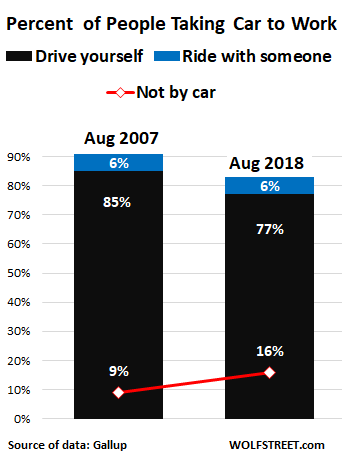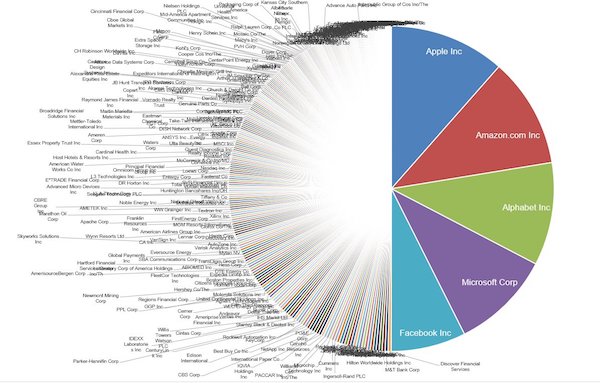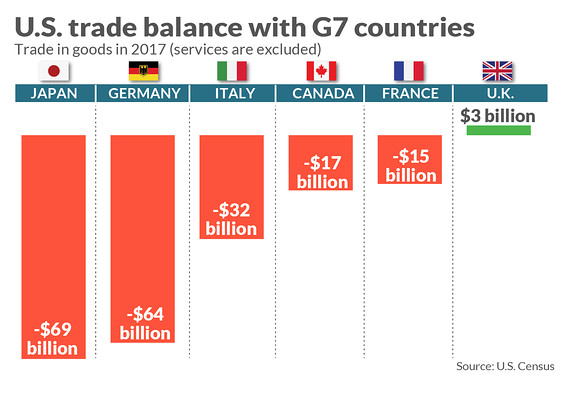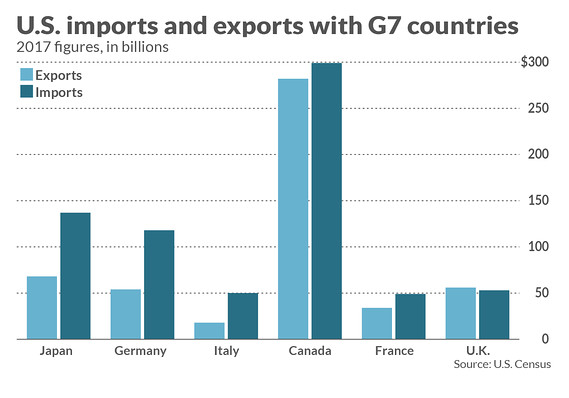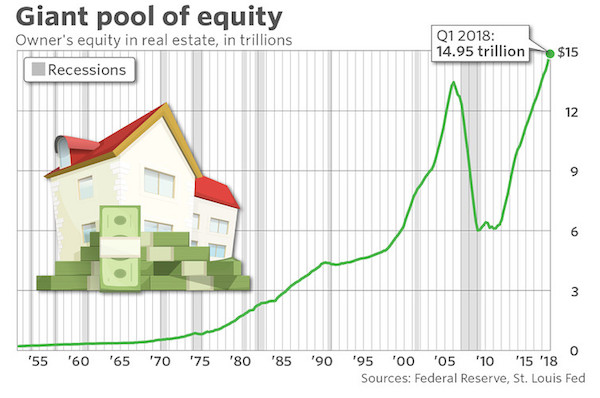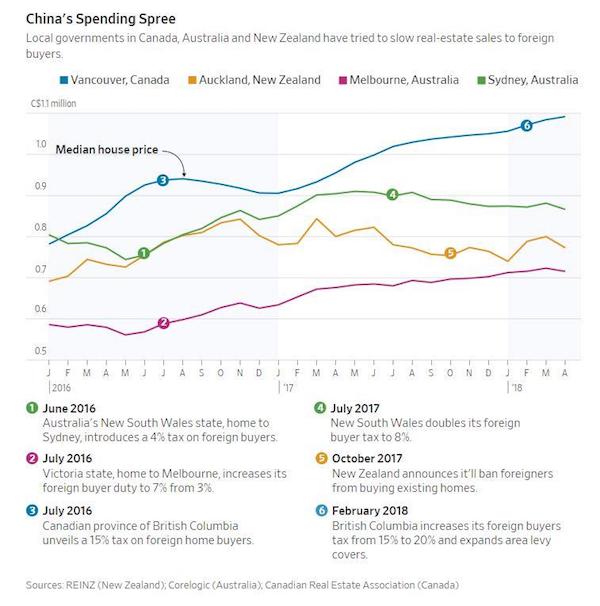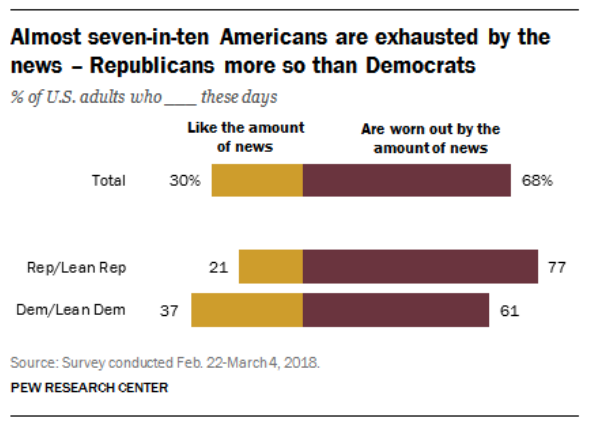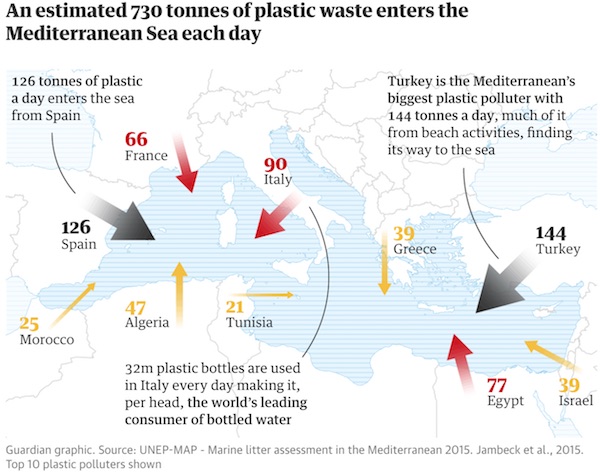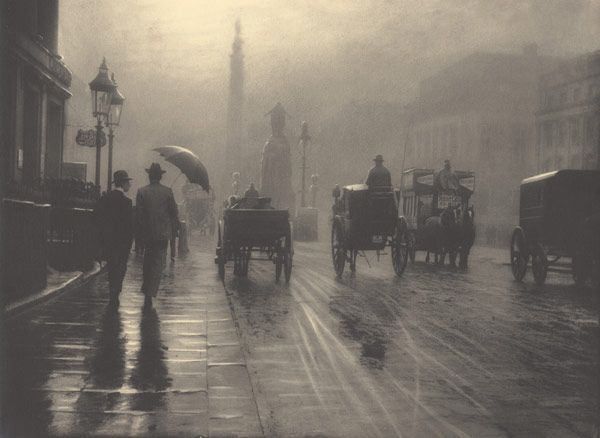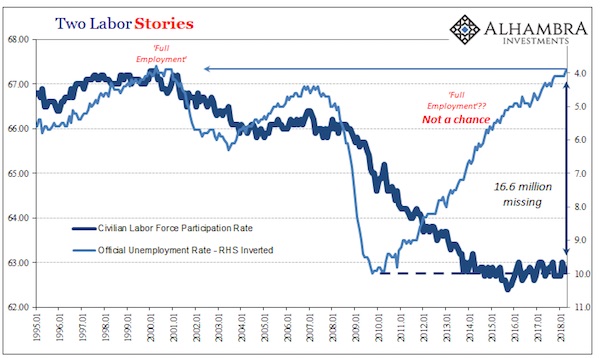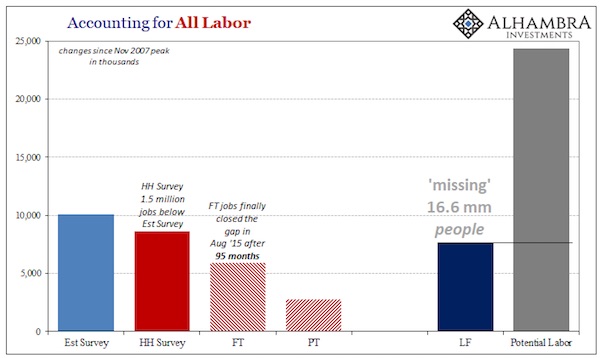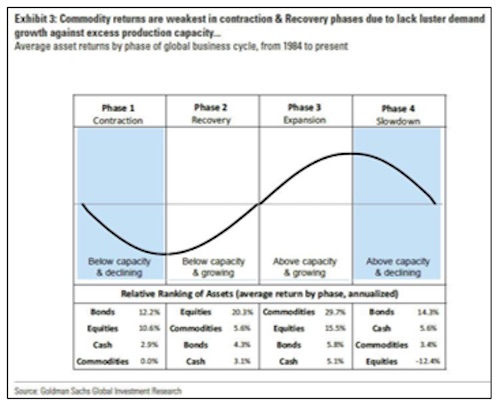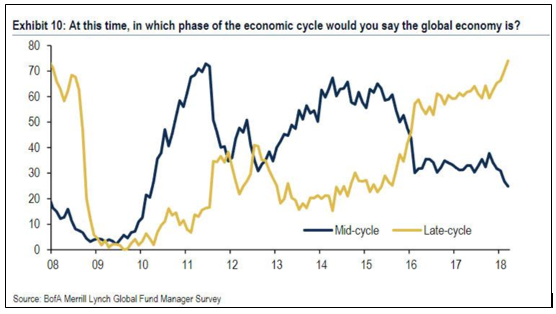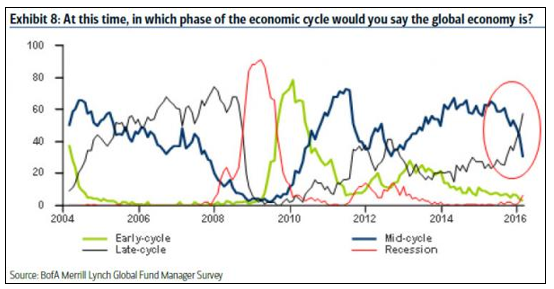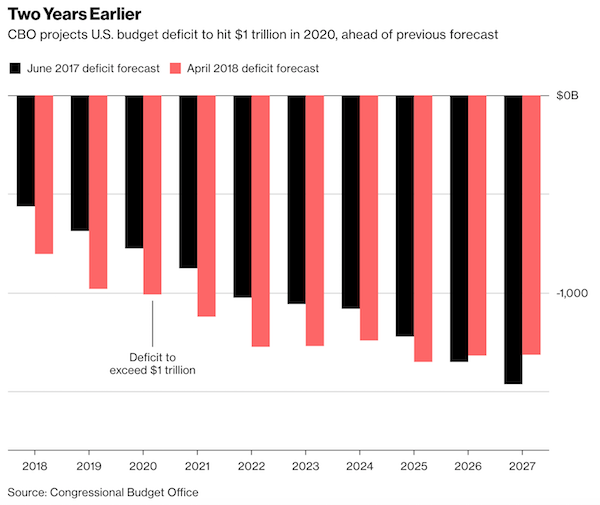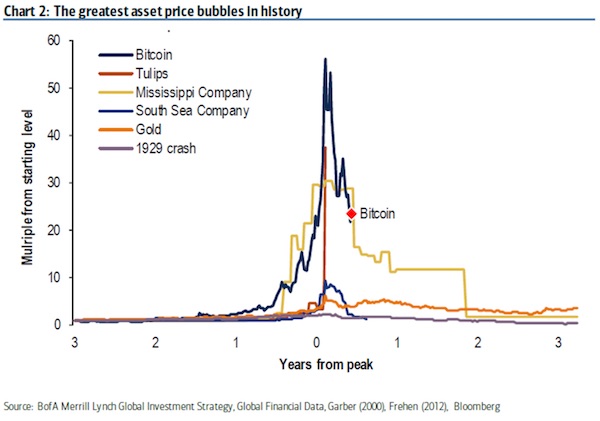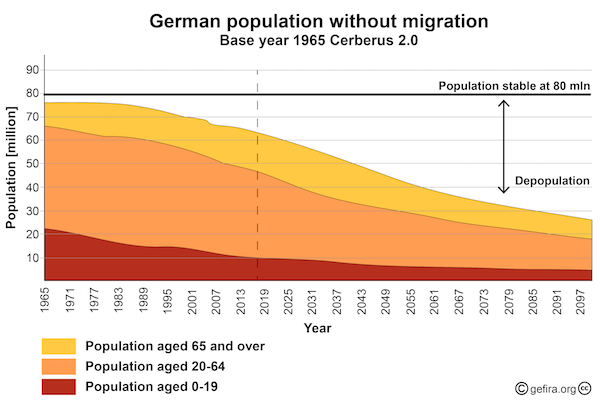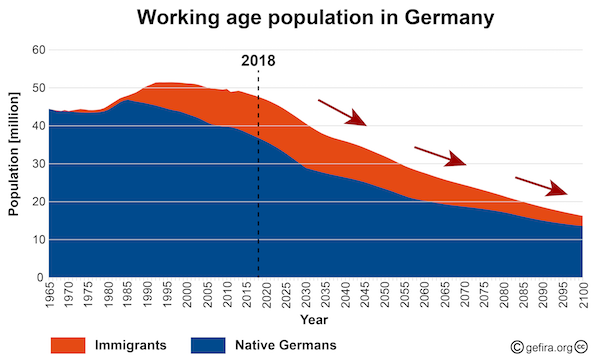
Vincent van Gogh Mountainous Landscape Behind Saint-Rémy 1888

Steady as she goes.
• US Federal Deficit Soars 32% To $895 Billion (Hill)
The federal deficit hit $895 billion in the first 11 months of fiscal 2018, an increase of $222 billion, or 32 percent, over the same period the previous year, according to the Congressional Budget Office (CBO). The nonpartisan CBO reported that the central drivers of the increasing deficit were the Republican tax law and the bipartisan agreement to increase spending. As a result, revenue only rose 1 percent, failing to keep up with a 7 percent surge in spending, it added. Revenue from individual and payroll taxes was up some $105 billion, or 4 percent, while corporate taxes fell $71 billion, or 30 percent.
The August statistics were somewhat inflated, however, due to a timing shift for certain payments, putting the deficit measure through August slightly out of sync with the previous year, the CBO noted. Had it not been for the timing shift, the deficit would have increased $154 billion instead of $222 billion. Earlier analysis from CBO projected that deficits would near $1 trillion in 2019 and surpass that amount the following year.

With 10 years of such market manipulation that there is no market left, what exactly is normal?
• The Fed’s Lost Opportunity to Return to Normal (Rickards)
Current Fed policy will push the U.S. economy to the brink of recession, possibly by later this year. When that happens, the Fed will have to reverse course and ease monetary policy. Meanwhile, the economic cheerleaders recite recent GDP figures and the stimulative effects of the Trump tax cuts. There’s one problem with the happy talk about 3–4% growth. We’ve seen this movie before. In 2009, almost every economic forecaster and commentator was talking about “green shoots.” In 2010, then-Secretary of the Treasury Tim Geithner forecast the “recovery summer.” In 2017, the global monetary elites were praising the arrival (at last) of “synchronized global growth.”
None of this wishful thinking panned out. The green shoots turned brown, the recovery summer never came and the synchronized global growth was over almost as soon as it began. Strong quarters have been followed by much weaker quarters within six months on six separate occasions in the past nine years. There’s no reason to believe this time will be any different. This expansion has been extraordinarily long — over 30% longer than average — indicating that a recession should be expected sooner rather than later. Into this mix of weak growth comes the Federal Reserve, which is tightening monetary policy, reducing the base money supply and supporting a strong dollar. All of these policies are associated with slower growth ahead and a high probability of recession.

Plunge protection. Imitating ECB.
• China ‘National Team’ Bought Billions In Stocks in Q2 – Goldman (CNBC)
As the mainland Chinese stock market dropped in the second quarter, groups with government ties bought shares, according to a Goldman Sachs analysis. The “national team” of entities related to or influenced by the state was formed in 2015 to help support stocks during that summer’s market turmoil. The Shanghai composite crashed more than 40 percent that year, and has struggled to recover since. The index’s losses accelerated in June, when it fell 20 percent from a recent high, or into a bear market. Beijing’s efforts to reduce the economy’s reliance on debt has led to tighter financial conditions, while rising U.S.-China trade tensions have added to pressure on growth. In all, the Shanghai composite lost 10 percent in the second quarter.
During that time, the national team bought an estimated net 116 billion yuan — or nearly $17 billion — worth of local stocks known as A shares, Goldman Sachs’ Chief China Equity Strategist Kinger Lau said in a Friday report.The second-quarter purchases account for about 0.2 percent of market capitalization and follow sales of 71 billion yuan in the first quarter, Lau said. Overall, his team estimated the national team holds 1.5 trillion yuan worth of A shares, or about 2.9 percent of the listed market capitalization. The findings are based on analysis of required quarterly disclosures of the top 10 shareholders in A share companies.
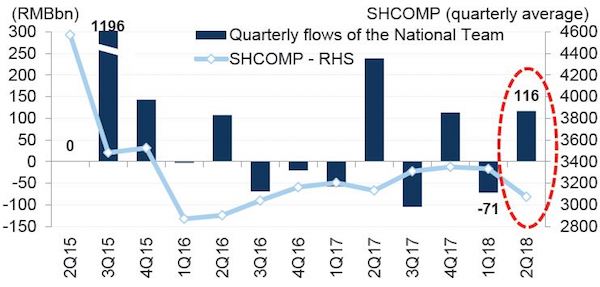
Source: Goldman Sachs Global Investment Research

Trump unites China and Russia.
• Putin Bashes Protectionism, ‘Sanctions, Bans And Political Bias’ (CNBC)
President Vladimir Putin appeared to take another thinly veiled swipe at Trump’s economic policies on Wednesday, a day after Russia and China vowed to stand together to fight protectionism. “The world and global economy are coming up against new forms of protectionism today with different kinds of barriers which are increasing,” Russian President Vladimir Putin told a plenary session at the Eastern Economic Forum (EEF) in Vladivostok, Russia. “Basic principles of trade — competition and mutual economic benefit — are depreciated and unfortunately undermined, they’re becoming hostages of ideological and fleeting political situations, in that we see a serious challenge for all of the global economy, especially for the dynamically-growing Asia-Pacific and its leadership,” he added.
Putin’s comments come as China and Russia appeared united on Tuesday after the leaders of both countries pledged to stand together to fight protectionism. The comments were seen as a thinly veiled attack on U.S. President Donald Trump who has implemented a massive package of tariffs on Chinese imports and threatened further sanctions on Moscow. [..] Putin said Wednesday that Russia and its eastern economic partners should work to keep trade free of barriers. “We’re convinced that in order for our region to continue to achieve high growth rates, and to remain a key participant in the global economy and trade, it should retain the spirit of economic freedom, to be the space of business initiative without sanctions, bans and political bias ,” Putin told delegates.

With a whole series of CCTV images. Because Russian secret agents on murder missions are too stupid to avoid their photos being taken. There is even one where they take time to ‘pose’ by looking into a shop window with a camera, taken AFTER the ‘attack’.
• Skripal Poisoning Suspects Are Civilians, Not Criminals, Says Putin (G.)
The two men accused by the UK of carrying out a nerve agent attack in Salisbury have been identified and are civilians, not criminals, Vladimir Putin has said. “We know who they are, we have found them,” Putin said at an economic forum in the eastern Russian city of Vladivostok, adding that the two men – named by the UK as Alexander Petrov and Ruslan Boshirov – might soon make appearances in the media to protest their innocence. “These are civilians,” Putin said in remarks reported by Russian news agencies. “There is nothing criminal here.” British officials have said the men were agents of Russian military intelligence dispatched to kill Sergei Skripal, a former Russian spy who had given information to British intelligence. He was imprisoned in Russia before being released in a spy swap in 2010.
Putin’s remarks appeared to be a denial that the men worked for Russia’s military intelligence service the Main Directorate, commonly called the GRU. British officials this month charged the two men in absentia with the attempted murder with novichok of Sergei Skripal, his daughter, Yulia, and a police officer who investigated the scene. Scotland Yard released CCTV images of the two suspects at Salisbury train station on the day of the attack. [..] Putin called on the two men to appear in the media to protest their innocence, saying he “wanted to address them directly”. The Russian’s president’s words marked a departure from his country’s earlier position, which was to disregard the evidence released by Scotland Yard as a fabrication.

And the military too. And this is just what you’re allowed to know.
• UK Police Prepares For Disorder At Ports If UK Crashes Out Of EU (Ind.)
Police are preparing for disorder at British ports in the event of a no-deal Brexit, Metropolitan Police Commissioner Cressida Dick has revealed. The head of Scotland Yard said her force was also bracing for the loss of key European data systems that are “very important” for keeping London safe. She said that the police were conducting careful, calm and sober contingency planning for eventualities, particularly relating to ports in Kent as well as in other parts of the UK. “Is there going to be protests, is there going to be disorder?” she asked, while addressing delegates at the Police Superintendents’ Association conference in Leicester. “At the moment in planning terms it’s a long-way off because there are so many uncertainties that could happen.”
Her comments came after a leaked document prepared by the National Police Coordination Centre revealed the “real possibility” of police calling on the military to help with civil disorder caused by a no-deal Brexit. It warned of traffic queues at ports and said concerns around medical supplies could “feed civil disorder”, while a rise in the price of goods could also lead to “widespread protest” and trigger crimes such as theft. Ms Dick raised additional concerns over the potential loss of access to EU systems including the European Arrest Warrant, Europol and databases containing information on criminals and terrorists entering the UK. “At any one time in my custody suites I will have 35, 40 per cent foreign nationals, over half EU citizens and a huge chunk would have travelled through Europe,” she explained.

The UK still thinks they can make separate deals. It doesn’t understand the EU.
• Barnier Confronts Raab Over Discovery Of Brexit No-Deal Letters To EU27 (G.)
Dominic Raab has been reprimanded by Michel Barnier after the EU’s chief negotiator discovered the British government had written to the 27 other member states asking for side negotiations on transport in the event of a no-deal Brexit. The Brexit secretary was confronted by Barnier during their most recent meeting in Brussels over correspondence sent in recent days to EU capitals by the Department for Transport. The letters had asked the member states to prepare to engage with the British government in side deals on aviation and haulage, to allow key trade flows to continue in the event of the UK and the EU failing to come to an agreement on leaving the union by 29 March 2019.
The transport secretary, Chris Grayling, had ordered the letters to be sent despite being told less than two weeks ago by the European commission’s most senior trade official, Violeta Bulc, that without a deal this autumn, there would be no other agreements made to protect the UK economy. Barnier is said to have reiterated that message to Raab, telling the cabinet minister: “If there is no deal, there is no trust.” The bruising exchange came on the same day that Theresa May told cabinet members the UK should remain “the EU’s closest ally” after Brexit, amid a growing belief in Downing Street that progress was gradually being made in the long-running divorce talks.

A few of them may understand the issues, but the majority sure don’t.
• Europe Is Voting On Controversial Internet Copyright Law (CNBC)
European parliamentarians are set to vote on a controversial copyright law that some critics believe could stop people from sharing memes and articles online. Lawmakers in Strasbourg, France, will cast their votes on the European Union’s new copyright directive on Wednesday. The result of that vote could determine whether large tech companies including Facebook, Twitter and Google are forced to use filtering systems that block copyrighted content. Two particular parts of the directive have attracted the most criticism from pro-internet freedom activists. One is Article 13. This section calls on internet giants to take “appropriate and proportionate” measures to prevent user-generated content that infringes a rightsholder’s copyright.
This part of the law has come under heavy criticism over concerns that tech giants could end up using automated content filtering systems. The law states that “effective content recognition systems” should be put in place by digital companies to prevent copyrighted materials from being distributed on their platforms. Campaigners have scrutinized this part of the legislation over concerns that it could amount to censorship, and argue that the use of copyright-protected material by way of commentary or parody should be permitted under the doctrine of “fair use.” Particular attention has been paid to the status of “memes,” which often rely on copyright protected images or pieces of video, and whether they could be censored as a result.

Echoing a point I’ve been making.
• Americans Need Social Media Guided by the US Constitution (Krieger)
This past Friday, Alex Jones was de-platformed from the last couple of third party tools he had been using to publicly communicate his message after Twitter and Apple permanently banned him and his website Infowars. This means an American citizen with a very large audience who played a meaningful role in the 2016 election, has been banned from all of the most widely used products of communication of our age: Twitter, Facebook, Google’s YouTube and Apple’s iTunes. You can point out he still has his radio show and website, and this is unquestionably true, but when it comes to the everyday tools most people interact with to receive information and communicate in 2018, Alex Jones has been thrown down the memory hole. Not because he was convicted of a crime or broke any laws, but because corporate executives decided he crossed an arbitrary line of their own creation.
It’s not against the law to be crazy or say crazy things in this country. It’s also not against the law to say hateful things. It’s pretty obvious the main reason Alex Jones was deleted from public discourse by Silicon Valley executives relates to his impact and popularity. [..] unabashed bigots like David Duke and Louis Farrakhan continue to have active presences across social media, and rightly so. The difference is neither David Duke nor Louis Farrakhan played a major role in the election of Donald Trump, whereas Alex Jones did. Jones and Infowars were having an outsized impact on the U.S. political discourse in a manner tech giant executives found threatening and offensive, so they collectively found excuses to silence him.
When the outrage mob consisting of politicians, corporate media outlets like CNN, and even his own employees, complained to Twitter’s Jack Dorsey on the issue of Alex Jones, he couldn’t hold the line on free speech because his company’s own policies are junk. Twitter, Facebook and YouTube should have a clear policy when it comes to speech, and it should be this: If it isn’t breaking the law – in other words, if it’s protected speech under the First Amendment – it stays up. Period. When you have corporate rules against “hate speech,” you’re relying on a concept that doesn’t really have any sort of legal standing when it comes to free speech in this country. There is no “hate speech” exception to the First Amendment of the U.S Constitution.

They want to regulate themselves. Don’t let them.
• Internet Industry Group Backs ‘National’ Data Privacy Approach (R.)
A group representing major internet companies including Facebook, Amazon.com and Alphabet said on Tuesday it backed modernizing U.S. data privacy rules but wants a national approach that would preempt California’s new regulations that take effect in 2020. The Internet Association, a group representing more than 40 major internet and technology firms including Netflix, Microsoft and Twitter, said “internet companies support an economy-wide, national approach to regulation that protects the privacy of all Americans.” The group said it backed principles that would ensure consumers should have “meaningful controls over how personal information they provide” is used and should be able to know who it is being shared with.
Consumers should also be able to seek deletion of data or request corrections or take personal information to another company that provides similar services and have reasonable access to the personal information they provide, it said. The group also told policymakers they should give companies flexibility in notifying individuals, set a “performance standard” on privacy and data security protections that avoids a prescriptive approach and set national data breach notification rules. Michael Beckerman, president and chief executive officer of the Internet Association, said in an interview the proposals were “very forward looking and very aggressive” and would push to ensure the new rules apply “economy wide.” He said the group “would be very active working with both the administration and Congress on putting pen to paper.”

Leftwing and intelligence.
• Armageddon Rides In The Balance (PCR)
For some time I have pointed out the paradox of the American liberal/progressive/left being allied with the CIA, FBI, military/security complex and deep state. Now leftist Ann Garrison has noticed the paradox of this alliance. She concludes that the left has lost its mind. Indeed, it has. Out of its hatred of Trump the left has united with the forces of evil and war that are leading to conflict with Russia. The left’s hatred of Trump shows that the American left has totally seperated from the interests of the working class, which elected Trump. The American left has abandoned the working class for the group victimizations and hatreds of Identity Politics. As Hillary put it, the working class comprises the “Trump deplorables.” The Democratic Party, like the Republicans, represents the ruling oligarchy.
I have explained that the leftwing lost its bearings when the Soviet Union collapsed and socialism gave way to neoliberal privatizations. The moral fury of the leftwing movement had to go somewhere, and it found its home in Identity Politics in which the white heterosexual male takes the place of the capitalist, and his victim groups—blacks, women, homosexuals, illegal immigrants—take the place of the working class. The consequences of the leftwing’s alliance with warmongers and liars is the leftwing’s loss of veracity. The left has endorsed a CIA orchestration—“Russiagate”—for which there is no known evidence, but which the left supports as proven truth. The purpose of “Russiagate” is to prevent President Trump from normalizing relations with Russia.
In these times when so many Americans are hard pressed, normal relations could adversely impact the budget and power of the military/security complex by reducing the “Russian threat.” If there is no real Russian threat, only an orchestrated perceived one, the question arises: why does the military/security complex have a taxpayer-supported annual budget of $1,000 billion dollars? The presstitutes have kept the truth from emerging that the “Russiagate” investigation has found no sign of a Trump/Putin plot to steal the 2016 presidential election from Hillary. Indeed, it has been proven beyond all questioning that the Hillary emails were not hacked but were downloaded on a thumb drive. This proof collapses the entire premise of “Russiagate.” Nevertheless, the hoax continues.

He might as well be talking about himself.
• Tsipras Warns “Europe Has No Future If It Doesn’t Admit Mistakes” (KTG)
Europe will have no future if the bloc does not admit mistakes in handling the financial and the migration crisis, Prime Minister warned the European Parliament on Tuesday. Alexis Tsipras said Europe could face an existential crisis over nationalism unless the bloc admits mistakes and its failure to handle a fiscal crisis and the deal with an influx of migrants effectively. The Greek Prime Minister said economic austerity pushed by European governments has fostered fear, racism and the emergence of the far right.“ The economic austerity pursued by European governments had fostered fear, racism and the emergence of the far right, he told lawmakers in the European parliament.
“The EU’s failure to give democratic and effective responses to modern challenges will lead irrevocably to the triumph of chauvinism and will rekindle nationalistic rivalry,” he said. “It will turn it into a fragmented continent, a continent without cohesion, without an international role, and without a future,” he said. Tsipras also criticised Europe’s handling of security and said this could have helped bolster support for far right parties. Several European countries including France and Belgium have seen attacks by Islamist militants in recent years. “The issue at stake is existential for Europe,” said Tsipras. “The handling so far of the financial crisis, the refugee crisis and a security crisis, has exposed huge deficiencies and contradictions.”

“93% of farmers expressed concern that the merger will harm independent farmers and farming communities.”
• Monsanto-Bayer Merger Hurts Farmers and Consumers (CP)
The U.S. Department of Justice issued a stern warning in its lawsuit against the conditionally-approved mega-merger between Bayer and Monsanto in June. The anti-competitive price effects of the merger would, according to the DOJ, “likely result in hundreds of millions of dollars per year in harm, raising costs to farmers and consumers.” The Justice Department warned that the combining of Bayer and Monsanto would reduce competition for vegetable seeds, likely driving up prices. Further, farmers might see prices for GMO cotton, canola, corn and soybean seeds increase, as well as price increases for herbicide and seed treatments. After imposing some limited divestments on Monsanto, the DOJ approved this merger, enabling Monsanto to hide its controversial name brand while giving Bayer anti-competitive control over seeds, pesticides, farmers and consumers worldwide.
But the harm to consumers and farmers will still exist. The DOJ is on the brink of essentially authorizing a monopoly. This is bad news for nearly everyone on the planet except Bayer and Monsanto executives and shareholders. Aside from a combined Bayer-Monsanto, only three other seed companies will be in the market manufacture and sell these products. Farmers overwhelmingly object to the merger. 93% of farmers expressed concern that the merger will harm independent farmers and farming communities. Farmers’ top three concerns were that Bayer/Monsanto “would use its dominance in one product to push sales of other products;” “control data about farm practices;” and that the merger will create “increased pressure for chemically dependent farming.”

Meanwhile, super typhoon Mangkhut is heading straight for Hong Kong.
• ‘Monster’ Hurricane Florence To Pummel US Southeast For Days (R.)
Hurricane Florence, on track to become the first Category 4 storm to make a direct hit on North Carolina in six decades, howled closer to shore on Tuesday, threatening to unleash deadly pounding surf, days of torrential rain and severe flooding. Fierce winds and massive waves are expected to lash the coasts of North and South Carolina and Virginia even before Florence makes landfall by early Friday, bringing a storm surge as much as 13 feet (4 meters), the National Hurricane Center in Miami warned. Catastrophic floods could follow if the storm stalls inland, it said. Although Florence was still days from arrival, authorities took extraordinary measures to move people out of harm’s way. More than 1 million residents have been ordered to evacuate from the coastline of the three states, while university campuses, schools and factories were being shuttered.
The U.S. Coast Guard closed ports in Wilmington and Morehead City, North Carolina and Hampton Roads, Virginia to inbound vessels greater than 500 tons and was requiring vessels of that size to leave if they did not have permission to be in the ports. Packing maximum sustained winds of 140 miles per hour (225 km per hour), the storm ranked as a Category 4 on the five-step Saffir-Simpson hurricane scale and was expected to grow stronger and larger over the next few days, the NHC said. “This storm is a monster,” North Carolina Governor Roy Cooper said. “Even if you’ve ridden out storms before, this one is different. Don’t bet your life on riding out a monster.” He cited forecasts showing Florence was likely to stall over North Carolina, “bringing days and days of rain.”
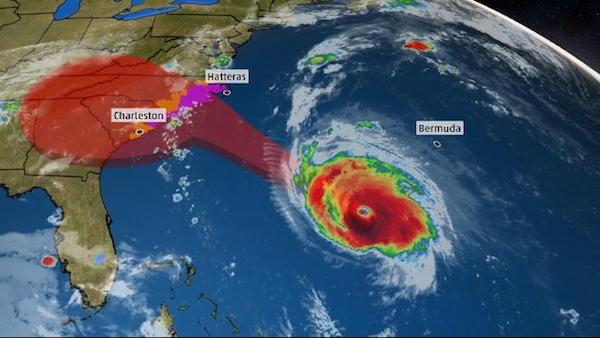
Graph: weather.com



